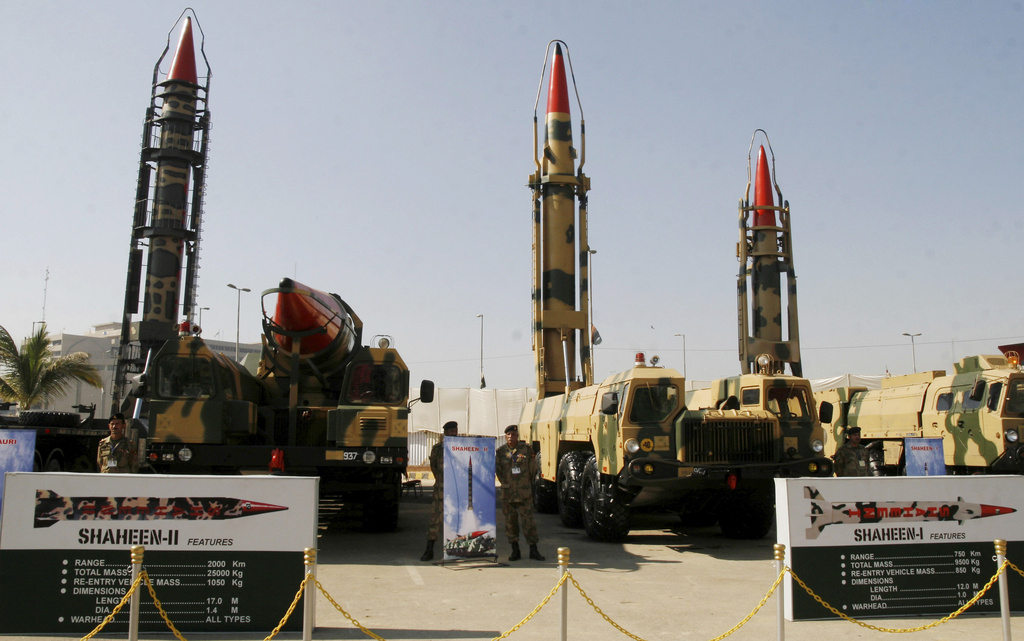Nuclear negotiations reach crucial stage

Switzerland is hoping that the eighth nuclear Non-Proliferation Treaty (NPT) review conference will for once end in consensus. But many issues remain unresolved.
The conference began on May 3 and has so far been positive, according to the Swiss delegation, although heels are expected to dig in and the debates become tougher as Friday’s final session approaches.
The United States and the four other countries allowed to keep nuclear arms under the NPT – Britain, France, China and Russia – are focusing their efforts on keeping weapons out of the hands of non-nuclear states, who in turn are demanding that nuclear states do more to honour their duties to global disarmament.
While North Korea and Iran in particular are suspected of enriching uranium with a view to building nuclear bombs, India and Pakistan, both nuclear nations, have yet to sign the NPT and are not officially at the conference. The same goes for Israel, which neither confirms nor denies having nuclear arms.
A separate issue under discussion in New York was the role of the International Atomic Energy Agency (IAEA). One suggestion to expand the agency’s authority was to enable it to perform inspections of nuclear facilities unannounced. However, not all countries accept such a proposal. Iran in particular has objected.
Another sign of progress, which would be welcomed by many countries including Switzerland, would be including negotiations at the United Nations conference on disarmament in Geneva concerning a ban on manufacturing weapons-grade, enriched uranium.
Concrete progress?
The NPT, which entered into force in 1970, is the founding document of multilateral non-proliferation endeavours. It deals with preventing the spread of nuclear weapons and contains commitments on non-proliferation, safeguards, nuclear disarmament, nuclear energy and nuclear-weapons free zones.
NPT review conferences are held every five years to take stock of and assess compliance with the anti-nuclear arms pact. They make decisions by consensus, which makes it difficult to reach agreements, since all 189 NPT signatories have a veto.
The previous review conference, in 2005, was widely viewed as a failure. It collapsed due to Egypt’s outrage at the failure to move forward on the Middle East nuclear-arms-free zone idea and developing nations’ anger at the United States for refusing to reaffirm disarmament pledges from 2000.
Switzerland hopes that this year consensus can be reached and a text agreed that advances nuclear disarmament “concretely, progressively and pragmatically”. The end document would be a political declaration not a legally binding text, the delegation added.
“Immoral and illegal”
Switzerland also backs UN secretary-general Ban Ki-moon’s idea of a convention for the condemnation and abolition of nuclear weapons.
Speaking in New York at the start of the conference, Foreign Minister Micheline Calmy-Rey described nuclear weapons as “extermination weapons” which were “immoral and illegal” and breached the foundations of international humanitarian law.
She announced that parallel to the conference, she intended to present a study drawing attention to the humanitarian aspect of nuclear war.
Switzerland has strengthened its commitment to disarmament not only at the conference but also as part of a foreign policy report in 2009 and a security report in 2000.
The foreign ministry pointed out it had good relations with all parties and did not have a hidden agenda.
Middle East
Some Western diplomats believe the success or failure of the meeting hinges on an Egyptian proposal to establish a zone free of nuclear arms in the Middle East, in an idea that could one day force Israel to scrap any atom bombs it has.
US efforts to secure a deal with Egypt and other Arab countries reflect Washington’s concern to win their backing for sanctions against Iran over its nuclear programme by offering a concession over Israel. But Washington says such a ban is impossible without peace in the Middle East.
Egypt, which chairs the powerful 118-nation bloc of non-aligned developing nations, circulated a proposal to all 189 NPT signatories calling for a conference by next year on ridding the Middle East of nuclear arms in which all countries in the region would participate.
Washington came up with a counterproposal, which calls for “the convening of a conference in 2012-2013 of all states of the Middle East to discuss implementation of the 1995 resolution in its entirety”.
The 1995 resolution adopted by NPT signatories calls for making the Middle East a zone without atomic bombs or other weapons of mass destruction, and notes that the Middle East peace process could help to make it a reality.
Egypt has insisted that both Israel and Iran would have to participate in such a conference, even though Tehran does not recognise Israel’s right to exist. Western diplomats agree, but say that Israel would be reluctant to participate.
Rita Emch in New York, swissinfo.ch (Adapted from German by Thomas Stephens)
The Treaty on the Non-Proliferation of Nuclear Weapons (NPT) was concluded in 1968 and entered into force on March 5, 1970.
Its first paragraph explained why the NPT was negotiated and needed: “Considering the devastation that would be visited upon all mankind by a nuclear war and the consequent need to make every effort to avert the danger of such a war and to take measures to safeguard the security of peoples…”.
The NPT is holding its eighth Review Conference from May 3-28 in New York. All countries except India, Israel, and Pakistan have joined the treaty, although in 2003 North Korea withdrew in order to develop nuclear weapons.
Switzerland is a party to the NPT as a non-nuclear weapons state and regularly hosts international summits on disarmament in Geneva. It has five nuclear power reactors generating about 40 per cent of the country’s electricity.

In compliance with the JTI standards
More: SWI swissinfo.ch certified by the Journalism Trust Initiative














You can find an overview of ongoing debates with our journalists here . Please join us!
If you want to start a conversation about a topic raised in this article or want to report factual errors, email us at english@swissinfo.ch.